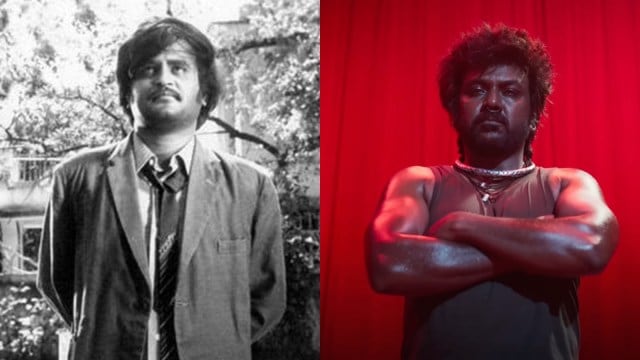Happy Birthday Rajinikanth: A look at how Jigarthanda DoubleX ...
Rajnikanth in Apoorva Ragangal and Raghava Lawrence in Jigarthanda 2.
Besides restoring Karthik Subbaraj’s position as a top Tamil cinema director, his latest venture Jigarthanda DoubleX has brought back a significant fact to the fore: Rajinikanth is the first-ever dark-skinned star of Indian cinema. Karthik, a self-proclaimed fanboy of the Superstar, thanked the actor even in the title card of the film. On top of that, the movie itself is a brilliant ode to Rajinikanth, who broke several norms of Tamil cinema back in the 80s when he emerged as the hero.

Jigarthanda DoubleX, a prequel to Karthi’s sophomore film Jigarthanda, is about Allius Caesar (Raghava Lawrence) a gangster in Madurai, who after an embarrassing incident at a party, resolves to become a hero. A contemporary fair-skinned actor Chinna (Arvind Akash) notes that it is impossible for Allius to become a star in Tamil cinema, where the tone and looks decide everything. Allius is a ruffian with a menacing demeanor which works for his illegal smuggling activity, but he doesn’t know how it is going to lend itself to his silver-screen aspirations. Enters Ray Dassan (SJ Suryah), a pretend-filmmaker, who is forced on a mission to kill Allius. Ray Dassan, in reality, is a coward, who is sent to jail on false murder charges. To get his freedom, he has to kill Allius. The film takes a huge turn post-interval when Ray convinces Allius to move to his tribal village.
At a particular moment in the film, Allius is asked to speed up the filmmaking as there is a debutant named Rajinikanth, who seems to have grabbed eyeballs with his debut film Apoorva Raagangal (1975). If Allius plans on becoming the first-ever dark-skinned hero, he has to beat Rajinikanth to it. At the surface level, this might just seem like a small hat tip to the Superstar, but the politics behind the ascent of both Allius Ceaser in Jigarthanda DoubleX and Rajinikanth in real life are perfect underdog stories.
It has to be noted that before Rajinikanth, there were hardly any dark-skinned actors in the industry. The few that were there often got relegated to villain roles or worse as hitmen of the villain (Pa Ranjith hit out at this by titling his film with Rajinikanth as Kabali, a name generally used for such henchmen). When filmmaker K Balachander, an iconic figure in Tamil cinema, decided to introduce this rather unique youngster in Apoorva Ragangal, he decided to name him after a colour–Rajinikanth, the colour of the night. Not just his name, but his skin complexion would become the subject of numerous jokes and comments in the films that followed. Even in Apoorva Ragangal, his current box office competitor Kamal Haasan calls him a beggar.

Like a lot of dark-skinned actors, Rajinikanth quickly got a lot of antagonist roles like Parattai in 16 Vayathinile. Even the name Parattai loosely denotes a ‘unkempt’ ruffian. Rajinikanth gradually transformed himself into this hero with grey shades, a characteristic that’s explored even now by the new-gen filmmakers. Lokesh Kanagaraj, who is set to direct the actor in Thalaivar 170, said he wants to explore the dark side of the Superstar. That’s another convention Rajinikanth broke. When everything was in black and white in the mainstream, the superstar often played characters in films like Polladhavan, Billa, and Netri Kann that were unbecoming of a hero. After all, Rajinikanth is the one who made smoking cool in Tamil cinema, when it used to be the symbol of the villain.
His colour has continued to be the talking point of many of his films like Sivaji, where his love interest tries to dismiss him for his skin colour. In Pa Ranjith’s Kaala, the colour was discussed in all seriousness. “Karuppu uzhaipoda vannam (Black is the colour of proletarians),” proclaims Kaala. Throughout the film, Rajinikanth is seen only in black, a trait that is seen in the members of Dravida Kazhagam, a political movement founded by Periyar. Rajinikanth’s on-screen image will always remain black. And one owes it to Karthik Subbaraj to remind the new-gen about what it must have been like for Rajinikanth back in the 70s.









































